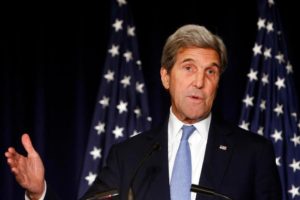
U.S. News & World Report:
The revelation of recent days that, back in January, President Obama agreed that the United Nations should lift its sanctions against two Iranian state banks which financed Iran’s ballistic missile development puts the lie to Washington’s claims – stubbornly maintained for more than a year – that it was determined to rein in the Islamic Republic’s expanding missile program.
In fact, the president’s decision reflects a larger pattern of U.S. backtracking over Iran’s ballistic missiles – one that dates back to well before the landmark U.S.-led global agreement with Iran over its nuclear program in July of 2015.
During the U.S.-led negotiations over that agreement, the president decided they should focus squarely on Iran’s nuclear program and not cover such related issues as Iran’s development and testing of long-range ballistic missiles that can carry nuclear warheads – despite the obvious tie between nuclear weapons and ballistic missiles.
With an agreement over Iran’s nuclear program in place, U.S. officials argued, they could then pressure Iran over not only its ballistic missile program but also its sponsorship of terror, its efforts to destabilize Sunni nations in the region and its increasingly grotesque human rights record at home.
But the public record – of which the new revelation about sanctions relief is now a part, courtesy of The Wall Street Journal – reveals something far different: While negotiating and implementing the nuclear agreement, Washington took multiple steps that not only legitimized Iran’s missile program but actually helped Tehran make further progress.
First and foremost, the United States agreed to soften the global prohibitions directed against that program.
Back in June of 2010, the United Nations Security Council adopted Resolution 1929, which was in place until July 2015 and which stated that Iran “shall not undertake any activity related to ballistic missiles capable of delivering nuclear weapons, including launches using ballistic missile technology.” That restriction was crystal clear.
But under Resolution 2231, which the Security Council passed in conjunction with the nuclear deal, Iran was merely “called upon not to undertake any activity related to ballistic missiles designed to be capable of delivering nuclear weapons, including launches using such ballistic missile technology.” In other words, what had been a legal restriction was now, at Tehran’s demand and with Washington’s assent, a rhetorical admonition.
Second, as we now know, the United States agreed to let the United Nations lift its sanctions against two Iranian state banks that financed the ballistic missile program eight years ahead of schedule.
